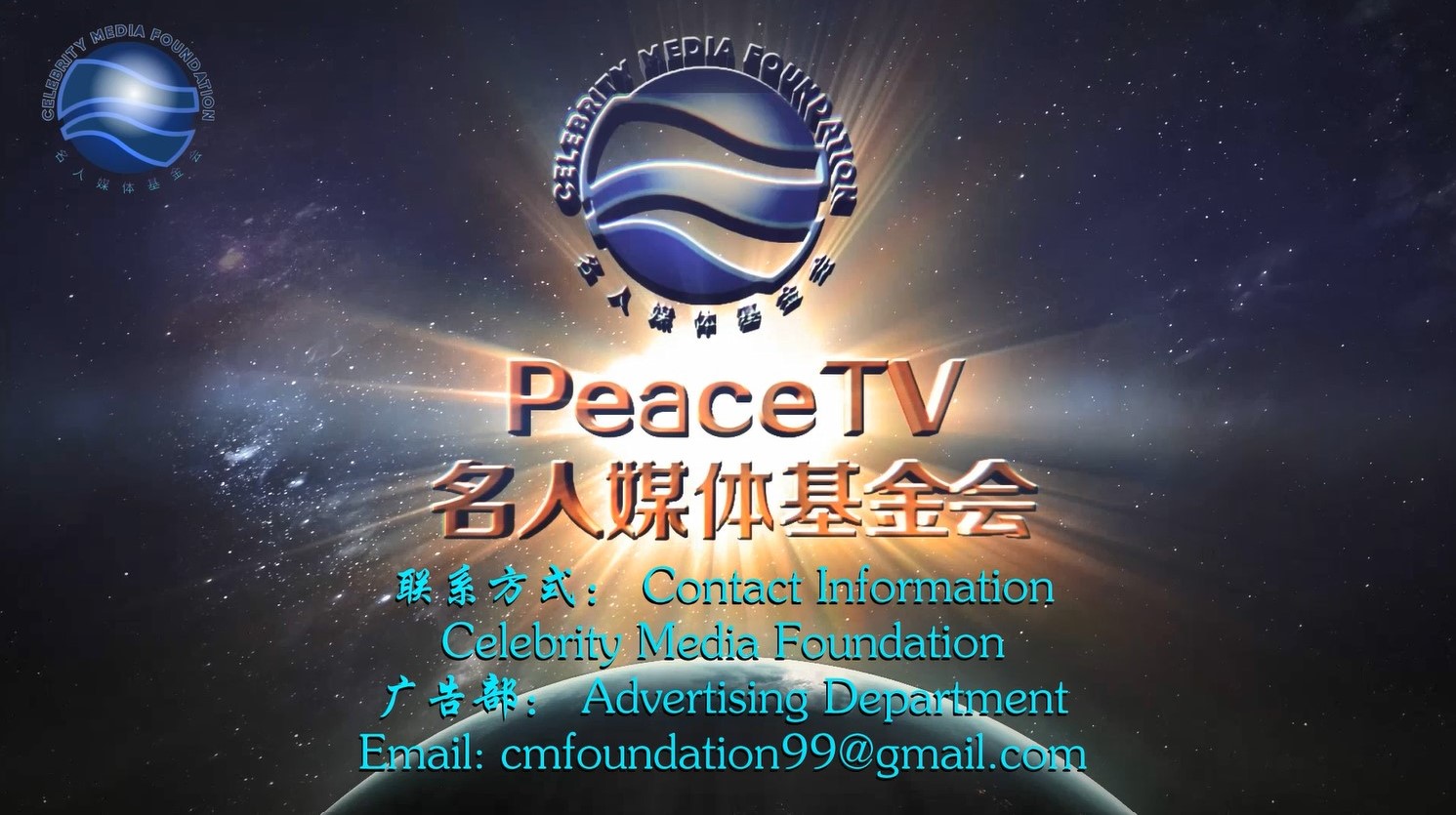
PeaceTV works for world peace and UN International Affairs


Chapter 1: General Principles
Article 1: Name
Chinese: 名人媒体基金会 (Celebrity Media Foundation)
English: Celebrity Media Foundation Inc.
Article 2: Purpose
The purpose of the foundation is to uphold the concept of universal love for world peace. It aims to spread Christian culture through the internet, support and sponsor gospel ministries of churches and organizations.
The foundation actively participates and cooperates with the United Nations Millennium Plan, humanitarian relief, and efforts to assist women and children. It focuses on promoting tolerance and peaceful coexistence among different ethnicities and cultural backgrounds worldwide, aiming for mutual development.
The Celebrity Media Foundation uses its resources to support and nurture a compassionate, charitable community and a responsible media environment.
The foundation is committed to enhancing media culture, supporting, and participating in community activities, encouraging celebrities and philanthropists to help improve the lives of the most vulnerable in society.
Article 3: Nature of the Organization
The Celebrity Media Foundation is a non-profit, charitable organization with a journalistic nature, registered in the State of New York as a 501(c)3 non-profit, tax-exempt charity, according to U.S. law.
Article 4: Operational Goals and Scope of Business
In line with the foundation's purpose, we will:
1. Establish comprehensive cooperation with global non-profit organizations and charitable institutions, sponsoring and supporting international affairs related to the United Nations' efforts in maintaining world peace.
2. Participate in charitable activities organized by gospel institutions, enriching the spiritual and cultural life of different ethnic and religious communities.
3. Organize or participate in meaningful social welfare activities to promote community harmony and development.
4. Use the internet and mobile internet to widely promote activities related to world peace and cultural exchanges between countries.
5. Promote other public welfare projects related to the foundation's purpose, such as producing micro-movies, television documentaries, publishing magazines, and other publications.
Chapter 2: Board Members
Members who abide by the board's charter, actively participate in board-organized activities, and implement board resolutions, confirmed by the co-registrants, can become members of the foundation's board.
As a non-profit organization, the foundation primarily recruits volunteers and part-time workers interested in public welfare. Those willing to serve or work part-time for the foundation for a year can become members of the board.
Board members are divided into: standing directors and general directors. The number of standing directors is limited to seven, admitted with the consent of the co-registrants; those willing to sponsor or become volunteers can become general directors without a limit on the number of positions.
Article 4: Rights of Board Members
Standing board members have the right to vote and be elected, participate in the affairs of the foundation, express opinions, and vote on related proposals. They have the right to receive assistance from the board and have priority in sponsoring projects decided by the board.
Chapter 3: Board Structure
From the date of registration approval, the first registrant is registered as the inaugural chairman of the board. The board appoints a secretary-general responsible for managing the daily affairs of the organization. When the number of board members exceeds seven, two vice-chairmen can be elected.
The board is the decision-making and management body of the foundation, composed of all current directors, responsible for the daily operations of the foundation under the leadership of the chairman. Board resolutions require the attendance of more than half of the current directors and are valid only with the chairman's signature.
The board will gradually establish departments such as Internet Technology, United Nations Affairs, Donation and Financial Management, Public Welfare Ministry, Public Relations and External Liaison, etc., to attract volunteers and participants.
Article 3: Formation of the Management Team
1. Chairman: The first registrant of the organization is the ex-officio chairman. When the number of board members exceeds seven, a new election can be held, nominated by at least three directors, elected by anonymous vote of the legally attending members of the board, using a simple majority decision. The elected chairman must be a U.S. citizen, and the membership fee paid by the elected chairman must not be lower than the annual standard paid by the registrants.
2. Heads of other departments of the organization are nominated by the chairman and take effect upon majority approval by the board. Any vacancy in any position shall be filled in the same manner.
3. To remove any of the above positions, a two-thirds majority of the legal attendees is required for it to be effective.
Article 4: Powers of the Board and Chairman
1. Board: Elect or recommend the chairman, deliberate, amend and pass the board charter, and vote to approve or deny various major proposals of the board. (Simple majority decision takes effect).
2. The term of office for standing directors is two years, with the right to elect and be elected to various department positions, and the right to propose and vote on various board proposals.
3. The chairman's term is four years, responsible for convening and presiding over the board, and representing the organization externally. During the term, the chairman is the president of the foundation.
4. The chairman presides over the affairs, leading the board to execute the tasks set out in Chapter 1, Article 4 of this charter.
5. The term of the secretary-general is two years, assisting the chairman in carrying out affairs, such as external contacts, coordinating department operations, handling documents, establishing archives, and keeping important data and documents.
6. The term of the standing directors is two years, participating in the decision-making and management of daily affairs, and being responsible for specific departmental tasks.
7. The secretary-general and standing directors may be re-elected for two years if there are no new candidates.
Chapter 4: Fund Management Department
Article 1: General Financial Principles
All funds of the foundation can only be used for expenses related to the organization.
The foundation's Fund Management Department manages the independent accounts, implementing a budget and final accounts system. Financial work is managed according to U.S. regulations, regularly reporting the foundation's financial status to the chairman and the board. For ease of management, all income of the foundation must be deposited into the foundation's bank checking account and then disbursed according to financial procedures. The Fund Management Department should formulate detailed financial management rules, clarifying the responsibilities and authority of each financial system.
Article 2: Personnel and Responsibilities
The foundation appoints a financial director responsible for the financial management of the Donation and Financial Management Department, determined by the board. The term is two years, with the option of re-election. Daily expenditure checks are signed by the financial director based on the handler's documents and kept on record, while checks over $300 must be signed by the chairman.
Article 3: Sources of Funds The main source is the annual fixed donations from the registrants, as well as donations from standing and general directors.
Other sources include:
1. Sponsorships from individuals and businesses in society, 2. Funds from cooperative projects and activities of the foundation, 3. Service fees from the Internet Technology Department and production fees, etc.
Chapter 5: Other
Article 1: The final interpretation of this charter lies with the board (simple majority vote).
Article 2: The foundation's external cooperation mechanism authorizes the Chief Director to make decisions and choose cooperation methods. As the foundation is a non-profit organization, all positions are based on voluntary service. Those holding the foundation's business card or authorization letter are for work convenience and do not represent an employment relationship with the foundation. (Except for those who pay the board membership fee annually or sign a contract).
Article 3: Students and non-citizens who need to apply for a work visa at the foundation must agree with this charter to become members of the foundation, pay the annual membership fee, and then proceed with the application. Agreeing and signing this charter, and signing a written work agreement, have certain legal binding.
Article 4: The term of office for the board of directors and major positions, as well as the transition between the old and new boards, is based on a two-year period starting from the date of registration and approval. If the annual meeting of the board members is not convened, the members of the previous board continue to serve and operate the organization.
Article 5: This charter is available in both Chinese and English versions, published on the foundation's website, and both versions have equal legal effect.
Article 6: For matters not covered in this charter, the chairman can convene the board members at any time to discuss and supplement or amend it.
Celebrity Media Foundation Inc. 
 Celebrity Media TV
Celebrity Media TV









